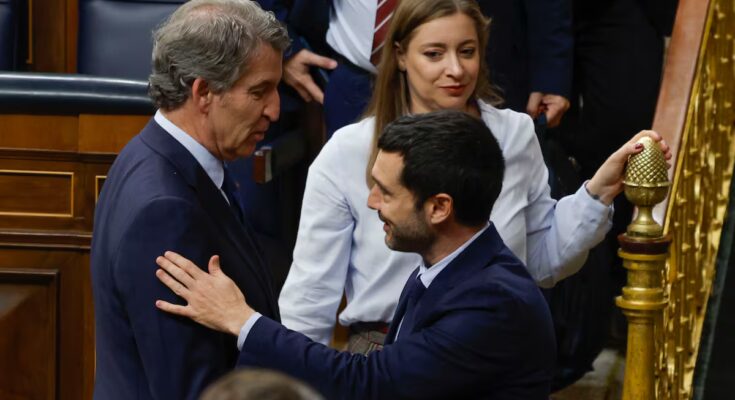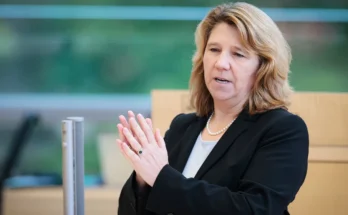At 2.57pm on Wednesday 19 November 2025, the entire Congress – 346 deputies present – voted in favor of a decree that provides funding for ALS patients with 500 million euros. It happened in the middle of this strange legislature. Harsh criticism came from PP and Vox, for what they consider to be a partisan use of that measure by the Government and for the one-year delay in the application of what was requested by Congress itself at the time of the approval of the law. There were self-claims from Junts, who included the goal among the commitments required to give his vote to the investiture of Pedro Sánchez. At the Ministry of Social Rights, which is the one that most promoted the coordination of this urgent decree “of the country and the general interest”, it was decided to praise the pressure of the associations of the affected people, who still don’t have time.
The debate was not a balm, because strong criticism was leveled at the Government for the delay in providing the resources necessary for a law that radically transforms the public system of care for the most dependent patients. But in the current context of the country and the political debate, the discussion to validate this royal decree turned out to be an oasis in which practically all spokesmen raised the level for a few minutes on a day in which Parliament was once again flooded with mutual accusations of corruption, essentially between PSOE and PP.
The decree on the 500 million approved a month ago by the Council of Ministers passed through the filter of Congress with a unanimity that was as unprecedented as it was extraordinary. The political protagonist was the Minister of Social Rights, Pablo Bustinduy, of Sumar, but the gazes of almost all the spokesmen were turned towards the visitors’ stands, where the representatives of half a dozen associations of affected people were lined up and in particular, as the most cited, towards Fernando Martín, the president of ConELA, who for a year has been trying to put pressure on the parties and coordinate the requests of all the patients and their families.
Pablo Bustinduy, in his initial and final presentation, avoided the moment of controversy and the usual parliamentary debate to broaden the focus with a certain “solemnity and determination” and put the spotlight on the current affairs of a day that he defined as a “social and political milestone of the country that improves democracy”. The minister underlined that the objective of the decree is to “strengthen the assistance system for patients suffering from ALS and similar” on three axes: the structural one, expanding the current qualification levels of patients with 3+ for particularly complex cases; the specific one, guaranteeing 24-hour care and up to almost 10,000 euros per month to be provided to the families of these patients; and the financial one, now injecting another 500 million into a dependency system damaged in recent years by underfunding and cuts.
The Ministry of Social Rights took the opportunity to highlight the usefulness of its department not only to bring the record and historical entries expected for addiction in 2025 to 3.7 billion, with increases of 15% compared to 2023, but also for other laws, such as last week’s customer service law, which thrived with the abstention of only the PP. Bustinduy has repeatedly extended his hand to associations, autonomies and groups and almost implored consensus “to demonstrate that politics is much more than a fruitless confrontation” and serves “to improve the lives of those represented”. And he concluded: “Here no one loses and we all win”.
The tone of the debate was unusual because, as the minister himself later concluded, “in essence” they all agreed. The spokesperson of the UPN, Alberto Catalán, first outlined the arguments of the complaints which were then echoed by the speakers of the PP and Vox. The right and far right have also validated the decree, in line with the almost unanimity with which this project has been supported in the hemicycle since Ciudadanos presented it for the first time in March 2022. Catalán, Rocío de Meer, of Vox, and Elvira Velasco, of the PP, asked themselves why the government is so satisfied with the importance of this transformation of the agency for the ALS law and that it has taken so long to find its financing and even now it has not been possible to specify with complete clarity how these extreme degrees of care will be determined and with what criteria.
The Executive’s regular partners, the Canary Islands Coalition, BNG, Podemos, ERC, PNV, EH Bildu and Sumar, have expressed their support, while having to admit that it has taken too long to get to this point and regretting that some inaccuracies still remain. Junts once again stood out in substance and form, but not in vote.
The nationalist deputy Pilar Calvo, very involved for years with the Catalan entities that bring together ALS sufferers, whom she mentioned and honored with a t-shirt in which the sun rises, has spread a series of criticisms so harsh against the Executive that they surpass those of the PP and rank at the level of Vox. He accused the ministries involved, Health and Social Rights, of lying to families and patients, blamed the PSOE and the Sumar executive for arriving “1,100 dead late, 134 Catalans” for having “suffocated them in bureaucracy” and asked the president of Catalonia, the socialist Salvador Illa, not to hide behind the fact of not having the tools to apply the measures and aid as soon as possible. Calvo was also the one who questioned whether the Government will grant the most seriously ill patients 10,000 euros per month, as provided for in the amendment to the law, and specified that it will be 4,930 and the rest through autonomies. This aspect remains to be clarified better in the coming weeks, even if the 500 million that the Treasury has reserved in the budgets serve to feed the dependency system in general through the Ministry of Social Rights, even if some measures are approved by the autonomies.
Bustinduy closed the debate with another series of appeals for the country’s consensus, for dialogue and for the “suspension of gratuitous and unproductive discussion” with a strange message for this political moment: “It is not necessary to transform anything into a short-term political instrument” and invited us to celebrate with the sick, the families, the associations “that the public powers” are with them “after many years of struggle”. An exceptional result voted and appeared on the Chamber’s scoreboard: 346 green votes in favor of a “law of the country, of the time and of general interest”.



